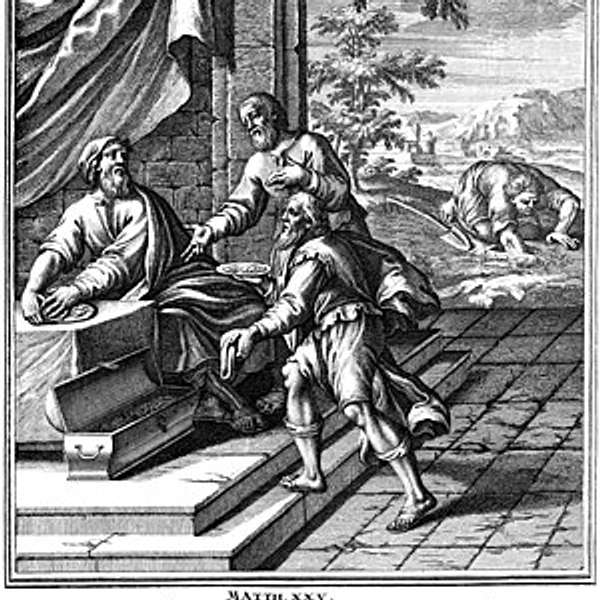
A New Voice of Freedom
A New Voice of Freedom
Season 5 Podcast 36 The Stories of the New Testament, Matthew 25 E, “The Parable of the Talents Pt 1.”
Season 5 Podcast 36 The Stories of the New Testament, Matthew 25 E, “The Parable of the Talents Pt 1.”
In the ancient world a talent was a unit of weight used to measure gold and silver. It varied significantly among different countries. A talent in Old Testament Times in Jerusalem, according to some Biblical scholars was 75 pounds. In New Testament times a talent refers to a very large sum of money. Using 75 pounds as the measurement, imagine the worth of a talent of gold in today’s market! We also use the term ‘talent’ to refer to skills or gifts, often referring to the arts, but, of course, the term is generalized to cover any gift of the spirit. In the Parable of the Talents, let’s assume that the man who distributed his talents among his servants was very rich and even the one who was entrusted with one talent had great responsibility.
Another assumption that we must make is the widow’s mite. It didn’t matter, for example, how many talents each was entrusted with. They were equal in the sight of God. What mattered was what they did with the talents God gave to them. There is no evidence in the parable that the person who was given five talents received a greater reward than the person who received only two talents. Both doubled the amount. The only one who was cursed was the one who buried his talent.
A third assumption that we must make is that Jesus is not talking about money. He is talking about service. More particularly he is talking about the conditions for entering the Celestial Kingdom. Let’s examine the opening line of the Parable.
“For the kingdom of heaven is as a man travelling into a far country, who called his own servants, and delivered unto them his goods.”
As discussed previously, there are two kingdoms of heaven referred to in the scriptures. One is the Kingdom of Heaven in heaven which refers to the throne of God. The other is the Kingdom of God on Earth, which refers to Christ’s church whose purpose is to prepare the children of God to enter the Kingdom of Heaven. That leads to a third assumption. The servants are servants of God left to build the Kingdom of God on Earth until Christ comes again. In other words, they are Christians. These are disciples of Christ. Do not confuse disciples just with the twelve apostles. For example, lets allow Paul to give us a description of who a disciple is.
“And he gave some, apostles; and some, prophets; and some, evangelists; and some, pastors and teachers; For the perfecting of the saints, for the work of the ministry, for the edifying of the body of Christ: Till we all come in the unity of the faith, and of the knowledge of the Son of God, unto a perfect man, unto the measure of the stature of the fulness of Christ: That we henceforth be no more children, tossed to and fro, and carried about with every wind of doctrine, by the sleight of men, and cunning craftiness, whereby they lie in wait to deceive; But speaking the truth in love, may grow up into him in all things, which is the head, even Christ: From whom the whole body fitly joined together and compacted by that which every joint supplieth, according to the effectual working in the measure of every part, maketh increase of the body unto the edifying of itself in love.” (Ephesians 4:11-16)
A disciple is one who follows Christ. Clearly each person referred to above has a different weight of responsibility. We could even, perhaps, compare the apostles and prophets to those who received five talents, and the others with lesser responsibility receiving fewer talents. It is important to note, however, that position and even responsibility, though necessary to the building up of the kingdom of God on earth is not relevant to their final reward. What is relevant is what they do with the talents entrusted to them.